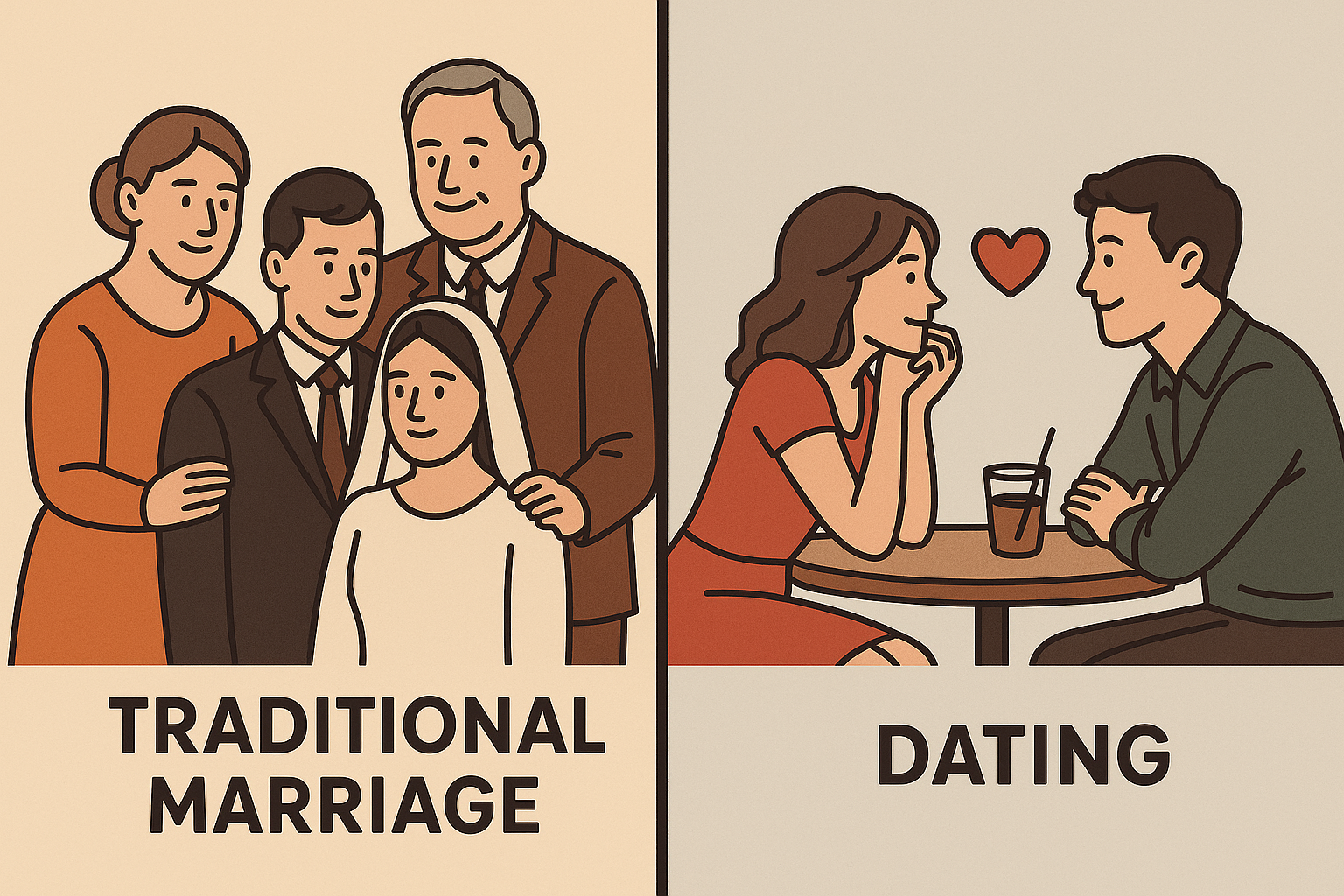Romantic love, which evolved from the ideals of medieval courtly love, gradually replaced traditional marriage customs in 19th-century England and America. From there it spread eventually to most of the world. The modern practice of ‘dating’ is a direct descendant of this tradition, as illustrated in the comparisons below.
Shared Practices and Beliefs in Courtly Love, Romantic Love, and Dating
-
Idealization of the Beloved
-
Shared Practice: Lovers are encouraged to place the other on a pedestal—especially the woman, who was often idealized as perfect or uniquely special, embodying unreachable beauty or virtue.
-
Negative Outcome: Leads to unrealistic expectations, disappointment, and emotional dependence.
-
-
Love as a Struggle or Trial
-
Shared Practice: Love is something to be won, often involving suffering, sacrifice, or elaborate performances.
-
Negative Outcome: Encourages self-destructive patterns, toxic persistence (e.g., chasing someone who’s not interested), or emotional games.
-
-
Emphasis on Secrecy and Intrigue
-
Courtly Love: Often adulterous or secretive due to social constraints.
-
Dating: Modern equivalents include hiding relationships, playing “hard to get,” or managing multiple dating “options” covertly.
-
Negative Outcome: Encourages dishonesty, emotional instability, and distrust.
-
-
Emotional Drama and Intensity as Proof of Authenticity
-
Shared Practice: Passion, jealousy, and even despair are treated as signs of true love.
-
Negative Outcome: Normalizes volatility and codependency; can foster manipulative or abusive dynamics.
-
-
Romantic Love as a Life Goal or Personal Fulfillment
-
Shared Belief: Love is central to identity and fulfillment (then and now).
-
Negative Outcome: People may tie self-worth to romantic status; leads to despair if romance is absent or relationships fail.
-
-
Reductive Gendered Roles and Ritualized Pursuit
-
Courtly Love: Men pursue; women are the gatekeepers.
-
Dating: This still persists—men often initiate, plan, pay, etc.
-
Negative Outcome: Reinforces outdated gender scripts, power imbalances, and societal pressure on both sexes to perform roles instead of relating authentically.
-
-
Performative Acts to “Earn” Affection
-
Shared Practice: Gifts, poetry, displays of chivalry or wealth used to impress the beloved.
-
Modern Equivalent: Grand gestures, curated dating profiles, expensive outings.
-
Negative Outcome: Relationships become transactional or based on surface-level traits rather than emotional substance.
-
-
Obsession with the “Chase”
-
Courtly Tradition: Desire thrives on distance and delay.
-
Dating: “The thrill of the chase” still dominates early-stage relationships.
-
Negative Outcome: People lose interest once commitment begins; breeds instability or ghosting.
-
-
Unattainable or Idealized Love Object
-
Courtly Love: The lady is often married or socially inaccessible.
-
Dating: Desire may be directed toward emotionally unavailable or disinterested partners.
-
Negative Outcome: Patterns of chasing the unavailable can lead to repeated emotional harm.
-
-
Suffering is Romanticized
-
Shared Idea: Emotional pain or longing heightens the beauty of love.
-
Negative Outcome: Can justify staying in unhealthy or one-sided relationships.
-
-
Public Performance of Love
-
Courtly Love: Love was often expressed in public poetry or tournaments.
-
Dating: Love is broadcast via social media (Instagram relationships, #CoupleGoals).
-
Negative Outcome: Creates pressure to appear in love rather than actually be connected; leads to comparison, anxiety, or jealousy.
-
-
Status-Seeking Through Romantic Conquest
-
Courtly Love: A knight’s value was partly judged by his lady and courtship prowess.
-
Dating: Social status may be enhanced by having an attractive or high-status partner.
-
Negative Outcome: Dehumanizes partners, fosters superficiality and insecurity.
-
-
Love as a Moral or Spiritual Elevation
-
Courtly Love: Loving nobly was believed to refine the soul.
-
Dating/Romantic Love: The belief that “the right person will fix me or make me whole.”
-
Negative Outcome: Co-dependency, avoidance of self-responsibility, magical thinking.
-
-
Temporary or Transitional Nature of Desire
-
Courtly Love: Often existed outside marriage and was not expected to last.
-
Dating: Many relationships are short-lived or “for the experience.”
-
Negative Outcome: Leads to emotional burnout, cynicism, and reduced capacity for trust or long-term commitment.
-
*Bullet points by Chat GPT.
